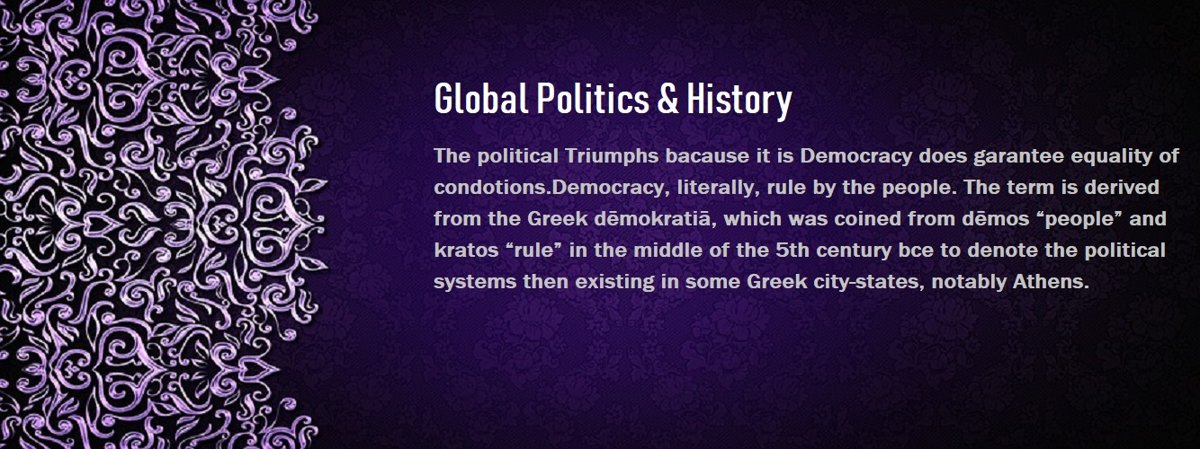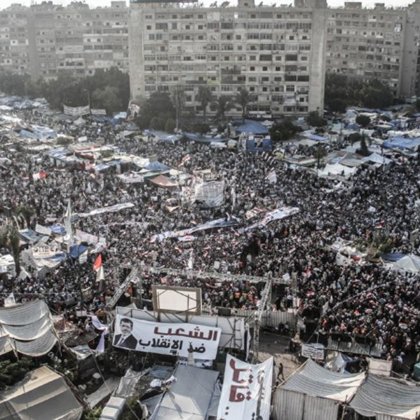THE EGYPTIAN RABAA MASSACRE ON JULY 3,2013, CURRENT GENERAL - TURNED - PRESIDENT FATTAH EL SISI LED THE COUP AGAINST PRESIDENTMOHAMED MORSI ,EGYPT'S FIRST FREELY ELECTED PRESIDENT. THE EGYPTIAN ARMY SHAMEFULLY SLAUGHTERING THEIR OWN PEOPLE, 817 PEOPLE WERE CONFIRMED KILLED.
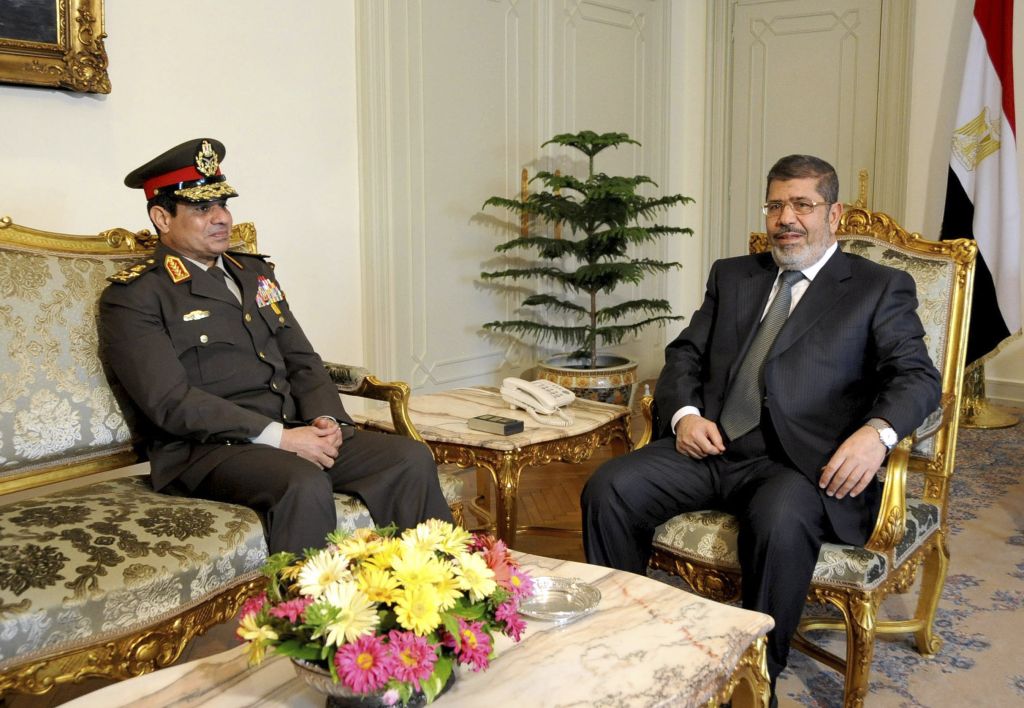 Egypt's president Mohammed Morsi (right) speaks with his defence minister, General Abdel Fattah,the final dialogue between General Abdel Fattah al-Sisi and Dr. Muhammad Morsi, which took place , a few hours before Morsi’s final speech to the Egyptian people. A reporter who was taken to an adjacent room was allowed to witness and transcribe their conversation from a TV screen.
Egypt's president Mohammed Morsi (right) speaks with his defence minister, General Abdel Fattah,the final dialogue between General Abdel Fattah al-Sisi and Dr. Muhammad Morsi, which took place , a few hours before Morsi’s final speech to the Egyptian people. A reporter who was taken to an adjacent room was allowed to witness and transcribe their conversation from a TV screen.
The Rabaa operation was carried out by the interior ministry, then led by Ibrahim, and supervised by Sisi, who was defence minister and deputy prime minister for security affairs. The commander of police forces on that day was General Medhat Menshawy.On 30 June 2012, in the aftermath of the pro-democracy 2011 Egyptian revolution, Mohamed Morsi, the chairman of the Freedom and Justice Party and high-ranking Muslim Brotherhood member, became the first freely-elected civilian president in Egypt’s modern history.Morsi’s tenure was short-lived, however. Exactly a year after his election victory, Morsi's opponents staged nationwide protests, blaming him and his party for the deteriorating economic and political situation the country was in.The protests were backed by the army, and on 3 July, 2013 Morsi was deposed by a military coup by his defence minister, Abdel Fattah el-Sisi, who is now president.In response, Morsi's supporters and critics of the coup, including Muslim Brotherhood members and pro-democracy civilians, staged nationwide protests demanding he be reinstated and a return to democracy.The largest sit-in was held in Rabaa al-Adaweya Square in the northern Cairo district of Nasr City. Some 85,000 protesters camped there for six weeks until they were violently dispersed, in what became known as the Rabaa massacre.Morsi supporters burned at least a dozen churches across Egypt. At least as many more have been set to the torch since June 30. But these represent neither entirely spontaneous retaliation against Christians, nor a sinister Muslim Brotherhood master plan. For the most part, they reflect sectarian tensions festering for a long time, worsened by the alternating neglect and provocations of successive governments: Mubarak, the previous military junta, Morsi. In the climate of the army’s assaults, these were almost destined to be unleashed. They were entirely predictable, in other words. If the military (whose hands still drip blood from the 2011 Maspero massacre of Copts) had wanted to protect Christians, they could have deployed to defend churches in advance of their own onslaught on the Brotherhood in Cairo. Sisi’s regime relaxed in indifferent inaction, and now mourns in hypocrisy; they did nothing to protect places of worship. They wanted the violence to swell.There was a people’s party but none of what revolutions are supposed to bring, people’s power. The middle-class revolutionaries of Tamarod who’d started the uprising were happy to hand power to the killers. They gave it to the army like waiters passing a dish: they couldn’t have been more pliant servants.It was midnight, when the streets are usually still teeming, but they were deserted in Agouza, where I live; we were the only people walking along the Nile corniche, and only two or three cars rushed past us, speeding off on urgent and incomprehensible errands. We plodded up vacant Shari’a Wezarat el Zeraa, trying to get to the Mostafa Mahmoud mosque, where Twitter said that clashes were still going on. The shops were all shuttered, but there was smashed glass everywhere. By the dark entrance of every building a couple of men sat dourly, delegated by the residents to protect the place. They had no resources but their unprepossessing presence. At almost every block an impromptu barricade, half-hearted as a semicolon, interrupted the empty street: cinderblocks scattered to stop cars, steel bars from a construction site. Suddenly there came a rush of thirty or more men running toward us. Five or six were brandishing revolvers, and one had a Kalashnikov. They passed and ignored us as if they or we were ghosts. A small crowd was pillaging an On the Run (an upscale food shop attached to a gas station), and they wanted to join in. It was impossible to say which side they were on; politics was suspended; one of them shouted “Morsi is President!” but that might have been a feint to blame the looting on the Brotherhood. A kid went by clutching a computer monitor with both arms. Fierce clashes broke out between the Egyptian security forces and thousands of Morsi supporters in Nasr City District of Cairo with armed forces firing tear gas to disperse thousands of angry pro-Morsi protesters at the 6th October Bridge in central Cairo. A Muslim Brotherhood official said at least 2,200 people had been killed and over 10,000 injured in the forceful evacuations, noting that the figure was provided by Raba'a hospital. The government, however, has put the death toll at nearly 90. This comes as the army-backed government says six security forces have been killed and nearly 70 others wounded during the clashes. Police used tear gas, armored vehicles and bulldozers to disperse the ousted president’s supporters camping out in al-Nahda Square and Rabaa al-Adawiya Mosque. Egyptian security forces stormed the main Rabaa al-Adawiya camp after evacuating the al-Nahda Square, the smaller of the two protest camps. At least two hundred people, including a number of Brotherhood leaders have also been arrested so far. Some reports say violence has also spread to Cairo’s Christian neighborhoods where three churches have been allegedly set ablaze. Meanwhile, clashes have been reported from several other cities. Violence in Fayoum, Suez and Alexandria has left nearly two dozen people dead. The country’s leading Islamic authority, al-Azhar has condemned the latest spate of deadly violence. The Grand Mufti of al-Azhar has called on the army-backed leaders and the Muslim Brotherhood to resolve their differences through negotiations. Ahmed al-Tayyeb says resorting to violence has never been an alternative to a political solution. The senior cleric has also called on all Egyptians to show restraint and take the nation’s interests into consideration. Egypt has plunged into unrelenting string of violence since General Abdel Fattah al-Sisi, the head of the Egyptian army pushed aside the first democratically elected president and declared chief Justice of Egypt’s Supreme Constitutional Court, Adly Mansour, as the interim president.
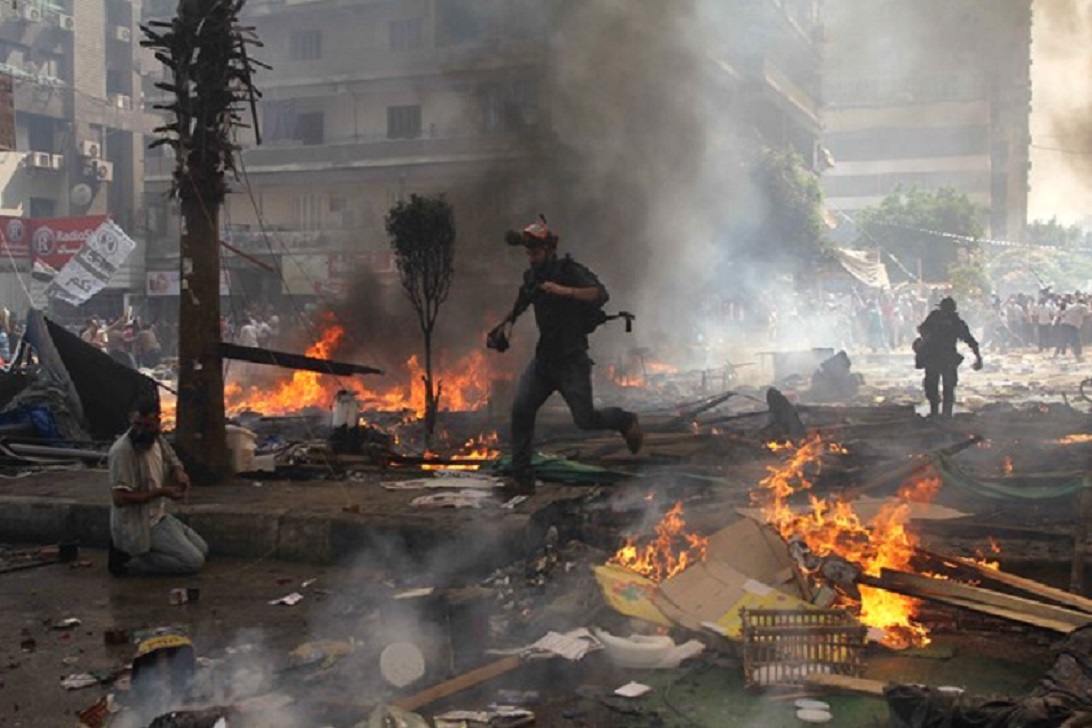
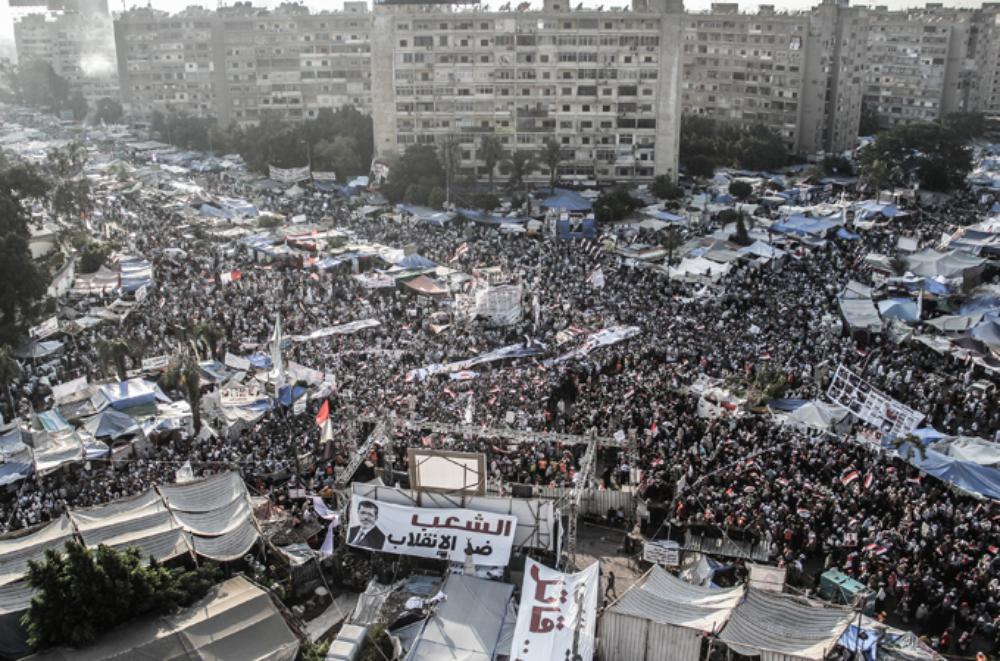 On August 12, the Anti-Coup Pro-Democracy Alliance called on people to hold nationwide rallies to counter the military clampdown on their sit-ins. The Egyptian army had earlier warned of taking action against the supporters of the ousted president. Rabaa Al-Adawiya mosque in Cairo, Egyp.
On August 12, the Anti-Coup Pro-Democracy Alliance called on people to hold nationwide rallies to counter the military clampdown on their sit-ins. The Egyptian army had earlier warned of taking action against the supporters of the ousted president. Rabaa Al-Adawiya mosque in Cairo, Egyp.
Hundreds of protesters, mostly Morsi’s supporters, have been killed or wounded during the unrelenting violence that has erupted since the removal of Morsi.
The Egyptian authorities’ repeated failure to respect the rights of protesters, and their failure to hold anyone accountable for mass murders, has contributed to an environment in which the security forces feel empowered to violate human rights with absolute impunityThe Egyptian government is currently conducting a mass trial against 739 people involved in the protest, including members of the Muslim Brotherhood a Morsi-allied group since banned in the country.1,000 Egyptians were slaughtered in the square outside the Rabaa mosque where they had gathered in support of ousted President Mohammed Morsi.Demonstrators were shot in the head and chest and the tents in which they had gathered set on fire. Bulldozers, soldiers and snipers advanced on the demonstrators before turning to a field hospital that had been set up to treat the wounded.Security forces began at 7am and continued shooting live ammunition at men, women and children for 12 hours. Blood literally flowed through the streets. The army has unbolted the cage and violence is loose. To the extent they plan, that’s their plan. The excess of force in the incursion on the Brotherhood sit-ins in Cairo was neither error nor overreaction; it was deliberate. (One sickly amusing thing has been to watch US neoconservatives and Likudnik flacks applaud the Egyptian indifference to “proportionality,” which they rightly see as modeled on Israel’s policy of murderously massive retaliation. Egypt’s nationalists have won the ally they least like.) It’s not so much that Sisi hopes to send a message that resistance is futile. He wants the Brotherhood to resist. The military knows that each murder makes a martyr; each burned Church gouges a new rift in communal relations; a descent into the mindless war of all against all is just their desire. The more the country divides, the more he destabilizes it, the more Sisi will be enthroned as an icon of fraudulent unity. He’s no narcissist; he doesn’t need to delude himself he’s loved. He wants citizens turning to him not in adulation but in desperation. Fear is the best propaganda.Brutal clashes between the Egyptian security forces and the protests against Mohamed Morsi’s removal lead to the killing of hundreds and thousands were injured.At what was initially intended to be a sit-in protest, the mood soon turned violent after Egyptian police moved to disperse the camps. The government said many protesters were armed and that eight members of the security forces were killed.Mohammed Morsi was toppled after a bloody military coup, headed by the incumbent President and former General Abdel-Fattah el-Sissi. Morsi was accused of deteriorating the Egyptian economy, aiding Hamas, spying for certain countries and polarizing society. People who were against Morsi and the Muslim Brotherhood went to the streets at the end of June to protest the Islamist government. After the protests started, the army sided with the protesters and gave an ultimatum to Morsi that said he had to resign in two days. Morsi stressed the fact that he was elected and only another election could remove him. The army did accept Morsi's argument of being elected. While the tension escalated in Cairo among different factions and the army, the people on the streets also expressed different demands. The sit-in protests to show solidarity with Morsi started even before the anti-Morsi protests. Despite the support of the masses the army overthrew Morsi and his cabinet, violating the constitution and universal democratic values. Morsi and many other prominent political figures that were also either members of the Muslim Brotherhood or related to it were arrested. Pro-Morsi and pro-democracy protesters did not leave the streets. They chanted slogans against Sissi and the coup. Sissi claimed that the protesters were threating national security while making a call to his supporters to go to Tahrir Square. Sissi finally gave the order to clear Rabaa Square, which had become the pro-Morsi protesters' main area. Aug. 14, 2013 has been called one of the worst days in Egyptian history.The security forces arrived in the morning to clear the square and blocked all the entrances and exits from 6:00 a.m. until 6:00 p.m., according to eye witnesses. Daily Sabah spoke to two of the witnesses to document the day.It was like a battle, we thought we should stay to help the other protesters by hurling stones and helping the injured. But of course we could not. We were getting shot at directly and we could not reach anyone to whom we could resist. Most of the time we were lying on the ground to protect our heads. One of my friends got injured and I went looking for him at Rabaa Hospital and I saw Asmaa el-Baltagy dead there.What I saw on that day was only death. I do not participate in protests anymore as I started believing that we should change our mentalities, tools and cooperate more to get rid of this coup. Police forces stopped us at the beginning, firing gas bullets only. But later they had strong back up and at 9:00 a.m. I saw with my own eyes a bullet killing a man. We had nothing in our hands but some rocks. At 12 o'clock I saw some snipers wearing police uniforms on the roof of a civilian building. They started firing on us, bullets were everywhere, blood covered the streets and we tried to reach inside the whole day until my brother was shot by a bullet in the back. He was treated by some doctors in a nearby mosque. It was such a bloody day. I was in shock and in the streets nobody believed what was happening. Every minute I was learning that another friend was killed, injured, lost or captured." Asma al-Beltagy was one of the victims of the coup in Egypt She was killed by a police officer using a sniper rifle to hunt protesters in the squares, chanting slogans against the coup and for Mohammed Morsi. She was only 17 when she was shot in Rabaa al-Adawiya Square, which has become the symbol of anti-coup protests. It was claimed that she was chosen as a target deliberately as her father Mohamed al-Beltagy was one of the leaders of the Muslim Brotherhood.When Mohammed Morsi swept aside the ageing commanders of Egypt's military a year ago and named a soft-spoken, religious younger general to head the armed forces, it was a demonstration that the military was subordinate to Egypt's first freely elected leader.Fast forward one year, and now it is the general, Abdel Fattah El Sisi, who has swept aside the president.At the time of his appointment last August, the choice of Gen El Sisi, 58, seemed to suit both Mr Morsi and the younger generation of army commanders seeking promotion after years under older generals such as 78-year-old Field Marshal Hussein Tantawi, Hosni Mubarak's defence minister for two decades.The army had produced the autocrats that had ruled Egypt for the previous 60 years. It had run the country during the tumultuous 16 months after the revolution that toppled the last general to serve as president, Mubarak.And it had seemed reluctant to hand power to Mr Morsi until the new president briskly dispatched Marshal Tantawi and a host of other commanders into retirement.Egyptians wanted their soldiers back in barracks, and the charismatic, chisel-jawed Gen El Sisi spoke like a man who would keep them there. Over the course of the next year, Gen El Sisi warned of unrest and political divisions, but repeatedly held firm in asserting that the army should not return to politics."The armed forces' loyalty is to the people and the nation," Gen El Sisi said in November when Mr Morsi's supporters and opponents clashed on the streets over plans to introduce a new constitution.He finally ditched his refusal to pick sides on Monday, announcing a dramatic ultimatum that gave Mr Morsi, the man who had chosen him, just 48 hours to agree on a power-sharing deal with his rivals.A career military man, Gen El Sisi was groomed for a leadership role after serving in top roles in the command, intelligence and diplomatic branches of the armed forces.Among his previous postings were a stint as defence attache in Riyadh, and command positions in the Sinai Peninsula and in the Northern Military Region, which includes the second city of Alexandria."He had been carefully prepared for a high command position," said Robert Springborg, an Egyptian military expert from the Naval Postgraduate School in Monterey, California.Apart from his comparative youth among top ranking commanders, two other attributes made him a good fit for Mr Morsi, who sought a new generation of military leaders.In a military known for its secularism, Gen El Sisi is a devout Muslim. And after a year at the US Army War College in Pennsylvania in 2005-2006, he was comfortable with the United States, which funds Egypt's military with $1.3 billion (Dh4.77bn) a year.

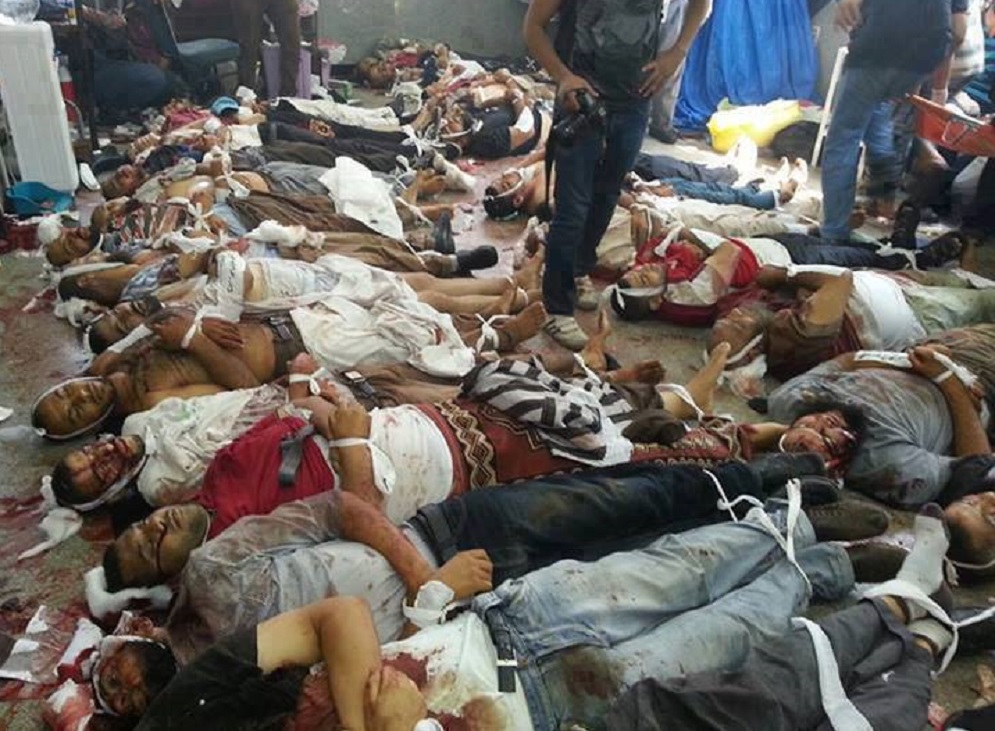 1,000 Egyptians were slaughtered in the square outside the Rabaa mosque where they had gathered in support of ousted President Mohammed Morsi.Demonstrators were shot in the head and chest and the tents in which they had gathered set on fire. Bulldozers, soldiers and snipers advanced on the demonstrators before turning to a field hospital that had been set up to treat the wounded.
1,000 Egyptians were slaughtered in the square outside the Rabaa mosque where they had gathered in support of ousted President Mohammed Morsi.Demonstrators were shot in the head and chest and the tents in which they had gathered set on fire. Bulldozers, soldiers and snipers advanced on the demonstrators before turning to a field hospital that had been set up to treat the wounded.
The Rab'a Massacre and Mass Killings of Protesters in Egypt," documents the way Egyptian security forces fired on crowds. "In Rab'a Square, Egyptian security forces carried out one of the world's largest killings of demonstrators in a single day in recent history," said Kenneth Roth, executive director of HRW. "This wasn't merely a case of excessive force or poor training. It was a violent crackdown planned at the highest levels of the Egyptian government. Many of the same officials are still in power in Egypt, and have a lot to answer for.In another scene, a man sits amidst burning tents in the aftermath. Behind him, there is a colossal wall of smoke caused by a barrage of tear-gas canisters. Shadows of armored vehicles and lines of soldiers loom, evoking a cruel inevitability. On the floor beside him is a blue water cooler, emptied in a feeble attempt to contain the massive fire that had spread across the camp. Lemons and cucumbers are strewn beside him, artifacts of the ordinary life that preceded the bloodbath. And there sits this lone being, the epitome of a man defeated.The Rabaa massacre has ignited anger around the world and today thousands of people not only in Egypt, but also from Turkey to Indonesia, organize demonstrations to condemn the bloody attack on the peaceful and unarmed protesters. While the Muslim Brotherhood claims that the death toll was more than 1,500, there was a minimum of 817 deaths.Even after two years, the massacre is still remembered as hundreds of people organized demonstrations across the world. Exiled Muslim Brotherhood members, who have established an organization, named Rabaa Story, to reveal the facts about the massacre and seek justice in international area for the victims, have been working to raise awareness in several locations .The Cairo Criminal Court sentenced 75 former Muslim Brotherhood (MB) members to death on Saturday over the Rabaa Al Adaweya dispersal, which resulted in the deaths of hundreds.Among those sentenced to death are Safwat Hegazy, Mohamed El Baltagy, Essam El Erian, Assem Abdel Maged and Amr Zaki.The prosecution has accused the defendants of numerous security related charges including the incitement to violence, organising illegal protests, blocking roads and restriction of movement, illegally possessing weapons and the murder of citizens and police officers.Since the Rabaa Massacre, Egyptian authorities have led a brutal crackdown on political dissidents, rounding up thousands and sentencing hundreds to life in prison, or death, in grossly unfair mass trials.Human rights groups estimate that as many as 60,000 political prisoners languish in Egyptian jails, significantly more than under Hosni Mubarak's dictatorship.Muslim Brotherhood members and alleged supporters of Morsi are though to constitute the largest number, but the mass detentions also include journalists, leftists, human rights activists - basically anyone who speaks out against Sisi.Some 13 new prisons have reportedly been built to accommodate the relentless number of detentions.Egyptian authorities promised a gradual dispersal of the protest, and said they would provide safe exits for people to leave the square.The actual dispersal, however, was the opposite of that. In the span of 12 hours, from sunrise to sunset, security forces fired live ammunition on large crowds of protesters in intense fusillades.The security forces used armoured personnel carriers (APCs), bulldozers, ground forces and snipers. They were covered by army tanks deployed outside the square.Then-Interior Minister Mohamed Ibrahim later admitted in a TV interview that he had anticipated at least 2,000 fatalities among the protesters during the dispersal. This was echoed by then-Prime Minister Hazem Beblawi, who also said in an interview with the press that “the final outcome was less that we expected”.The square was besieged for most of the day. Attacks were carried out from all the five entrances to the square, making it lethal for trapped protesters to try and leave the square or for the wounded to be transported to hospitals. Many of those who tried to escape were shot dead.
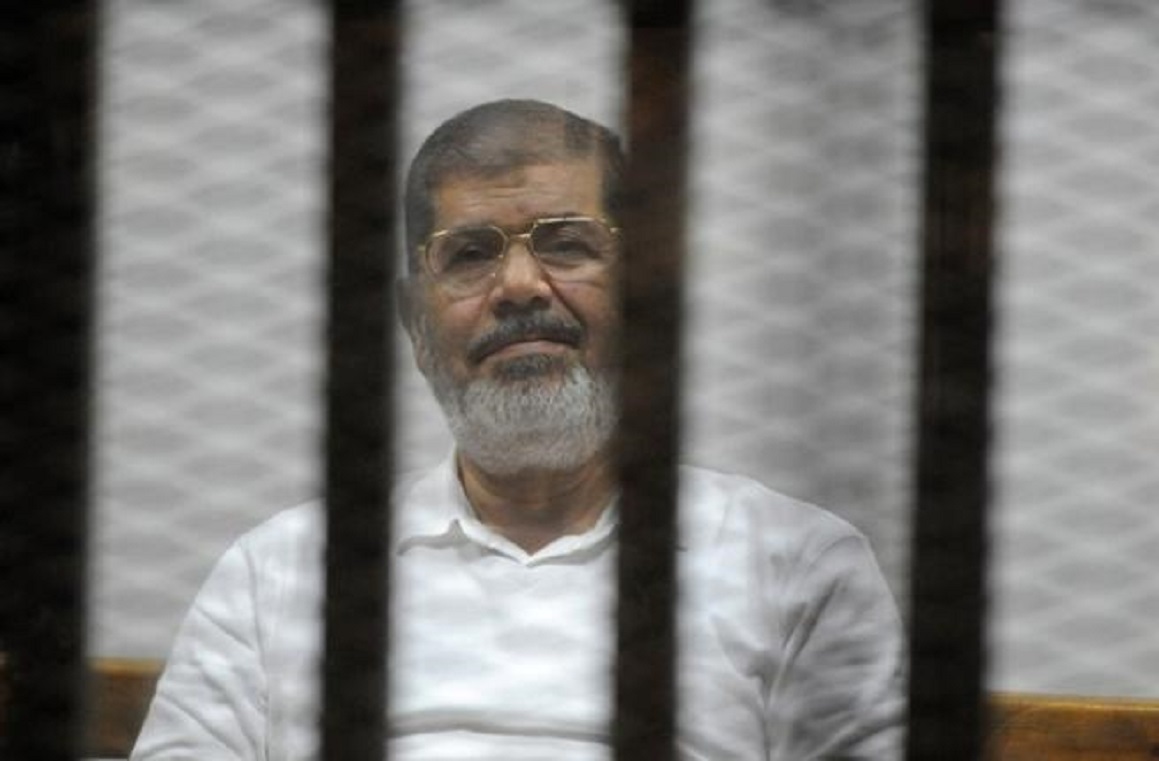
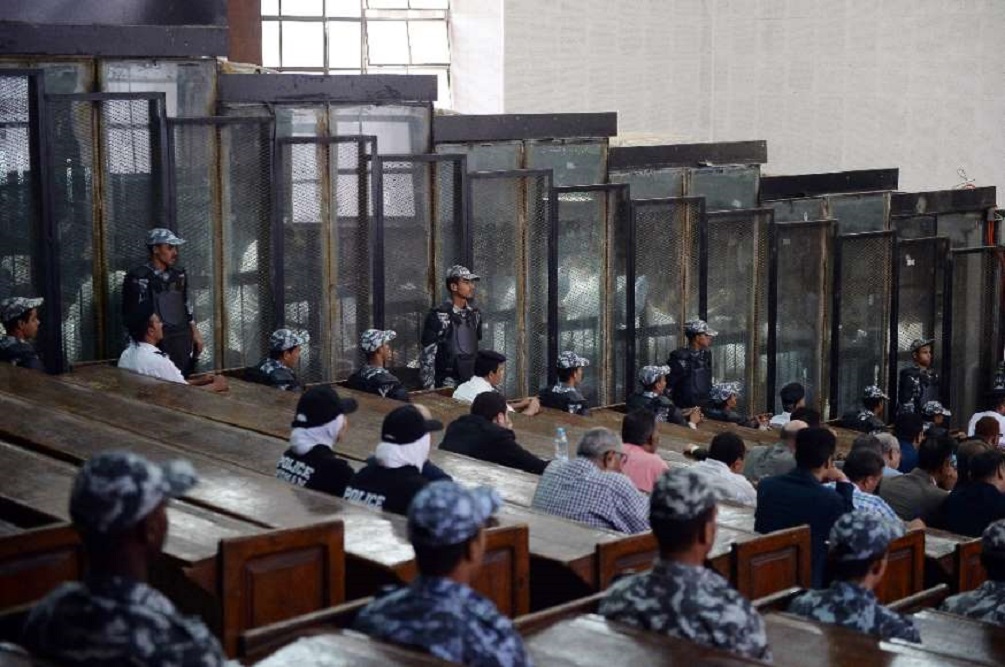 Egypt has sentenced 75 protesters to death and dozens more to life behind bars in a mass trial over a 2013 protest in support of the Muslim Brotherhood. In August 2013 up to 900 people were killed in Rabaa and nearby al Nahda square by security services after they gathered to demonstrate against the coup which had removed the elected president Mohamed Morsi. At what was initially intended to be a sit-in protest, the mood soon turned violent after Egyptian police moved to disperse the camps. The government said many protesters were armed and that eight members of the security forces were killed.
Egypt has sentenced 75 protesters to death and dozens more to life behind bars in a mass trial over a 2013 protest in support of the Muslim Brotherhood. In August 2013 up to 900 people were killed in Rabaa and nearby al Nahda square by security services after they gathered to demonstrate against the coup which had removed the elected president Mohamed Morsi. At what was initially intended to be a sit-in protest, the mood soon turned violent after Egyptian police moved to disperse the camps. The government said many protesters were armed and that eight members of the security forces were killed.
